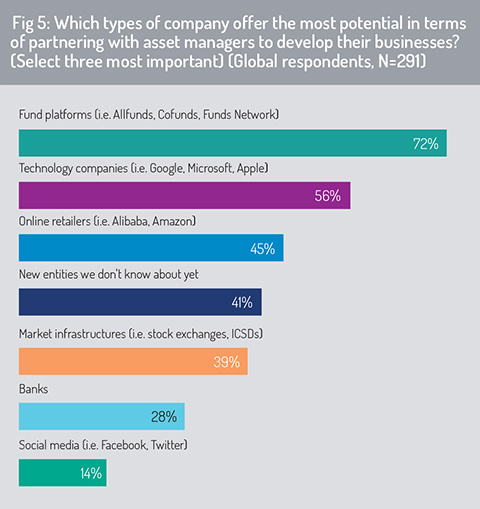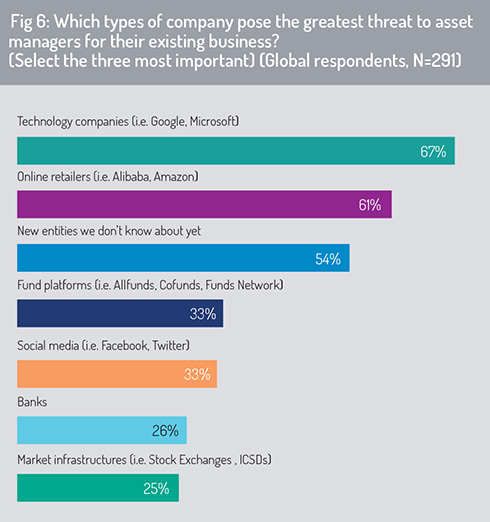The next section evaluates which companies will be the most valuable partners to asset management firms in managing business innovation and which will be the primary point of disruption to the investment funds industry.
Respondents to the global survey were asked to select the three most important answers from this list. This year, fund platforms (such as Allfunds, Cofunds, Funds Network) appeared at the top of the rankings (72%), with technology companies (e.g. Microsoft, Google, Apple, 56%), and online retailers (such as Alibaba and Amazon, 45%) also recognised as important service partners to asset management companies (fig 5). These three leading choices mirror the findings of last year’s survey.
In line with the global survey, Australia-based respondents highlighted fund platforms (e.g. Netwealth, BT Panorama) as the most valuable partners to asset management companies as we move into 2021 (58%). However, market infrastructure entities ranked second in this list (52%), perhaps highlighting the value of Calastone’s global transaction network and the major upgrades that ASX is making to its settlement and record-keeping systems, in supporting asset managers’ business development.
 Technology companies will also play an important role (48%), supporting cloud-based data storage and service delivery, developments in machine learning and AI, along with a range of other enhancements.
Technology companies will also play an important role (48%), supporting cloud-based data storage and service delivery, developments in machine learning and AI, along with a range of other enhancements.
Over two decades, large fund platforms such as Allfunds and Cofunds have established a comprehensive fund distribution network and have extended access to a wide universe of collective investment funds and ETFs. Wider research conducted by Funds Europe suggests that asset management firms are seeking partnership with fund platforms that extends well beyond a global sales function. The investment platform provides a transactional service linking product manufacturer, distributor and investor, supporting execution of subscription and redemption orders, provision of basic safekeeping services and access to tax-efficient wrappers in some locations.
Alongside this sales component, parties to the fund transaction may require a wider range of services – including support with compliance reporting, managing distributor agreements, transmission of data on distributor sales, portfolio monitoring tools, along with access to product information and fund documentation.
Partnerships between asset management firms and technology companies are taking a range of forms. Technological partnerships with BigTech firms can allow financial services companies to streamline their infrastructure, thereby reducing costs and increasing speed of service. Use of cloud-based data management is an obvious example. Partnership with BigTech firms may also offer access to new developments in data analytics, artificial intelligence or computer security that it may be impractical for an asset manager to develop entirely in-house.
Collaboration with online retailers and technology firms may also open up new distribution opportunities to asset management companies, particularly in emerging and frontier markets – including the potential to extend access to collective investments for communities that were previously weakly served by financial product coverage.
When we asked global respondents which types of company are most likely to disrupt asset managers’ business models, the global survey places technology companies at the top of the rankings (67%), alongside online retailers such as Alibaba and Amazon. Respondents believe there is also potential for new entrants to disrupt existing manufacture, distribution and transaction processing channels (fig 6).
 For Australia-based respondents, technology companies are expected to provide the greatest threat of disruption to asset managers’ existing business models (74%), with new entrants to the market (65%) and market infrastructure entities (48%) ranked second and third. In contrast to the results of the global survey, online retailers rank only sixth in this list for Australia-based respondents (26%).
For Australia-based respondents, technology companies are expected to provide the greatest threat of disruption to asset managers’ existing business models (74%), with new entrants to the market (65%) and market infrastructure entities (48%) ranked second and third. In contrast to the results of the global survey, online retailers rank only sixth in this list for Australia-based respondents (26%).
In considering the disruption caused by technology companies, two points are particularly relevant. Asset management companies may experience disruption through commercial competition, resulting in loss of sales revenue to competitor organisations.
A second potential threat emanates from the growing centrality of technology companies in providing essential services – particularly cloud-based data management and ‘as-a-service’ delivery options to asset management companies. Through these mechanisms, BigTech firms are adopting growing systemic importance in financial services – creating what the Financial Stability Board has warned may be a “too-big-to-fail problem”, where the failure of one of these firms could endanger the secure functioning of the industry (see further in Funds Europe and Calastone, ‘2020 Europe and UK survey’).
© 2020 funds europe





